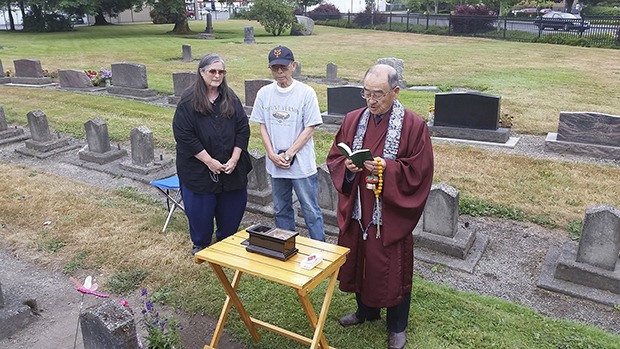The wind picked up at about 10:15 that gray morning, scattering fragrant incense, all but smothering the words.
To the rededication of the two graves in Auburn’s Pioneer Cemetery on July 9, a train added its blast.
From time to time, the Rev. Koshin Ogui reached into a lacquered black box, closed thumb and forefinger over a pinch of incense, withdrew it and dropped it on the brazier.
Nancy and Kenji Togami looked on as Ogui, sensei of the White River Buddhist Temple, picked up his chanting.
The couple had come from California, hoping to return with whatever time had spared of the remains of Kenji’s sisters, Mihoko, still born, and Yoko, dead of a childhood disease.
Both girls died before Kenji was born 78 years ago on the family farm in the community of Thomas at the present-day site of Emerald Downs.
It was one of many visits the couple had paid to Pioneer Cemetery over the years — and it was to be the last.
The couple had hoped later to inurn the ashes at the Sunset View Cemetery in El Cerrito, Calif., where Kenji’s parents, three of his sisters and his brother, Michael, are buried.
But when Craig Hudson, administrator of Auburn Mountain View Cemetery, had had the headstones lifted days earlier to see what if anything was under them, there were no ashes — the inexpensive wooden boxes and what was in them had long ago melted into the dust.
“We are disappointed we don’t get to take the ashes back to California,” Kenji said.
“We were going to take them back with us, and we were going to leave the headstones as cenotaphs,” Nancy said.
Like other Americans of Japanese ancestry after the Japanese attack on Pearl Harbor, the Togami family was removed to an internment camp, in this case Tule Lake, Calif. Kenji’s brother, Michael, was born in the camp. The family was among those that did not return to the Auburn area after the war.
“One way or the other, we were going to dedicate the cenotaphs. Now the girls will always be a part of Auburn,” Nancy said.


